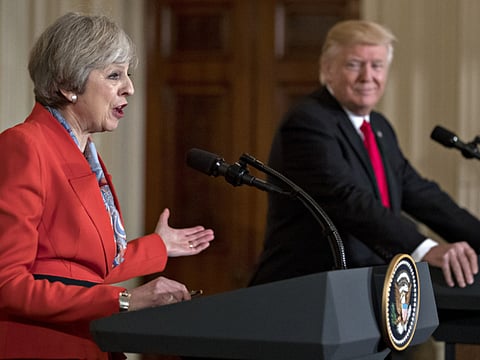What Trump wants from his visit to the UK
The ‘special relationship’ is very important to America — and the US president will be hoping to reinforce that tie

In the West Wing of the White House, each corridor has a ‘jumbo’. Jumbos are large blow-up photographs showing key moments from the current administration. There are jumbos of the vice-president visiting Auschwitz with his wife, of President Donald Trump’s first address to both houses of Congress and of the First Lady reading to children at the White House Easter egg roll.
Most of the jumbos are only temporary, and are soon rotated. But during the time I served under President Trump, there was one photograph which had stayed where it was, right outside the Oval Office, passed by some of the most powerful people in the world dozens of times each day. It showed Trump with Prime Minister Theresa May, during her first visit to Washington DC. For Americans, especially those of a conservative persuasion, the special relationship is not pablum or a quaint relic of yesteryear deployed to engender a warm yet impractical feeling. It is real. Along with the relationship with Israel, it is the most important friendship our nation cherishes. (Apologies to the Elysee, but this is simply a statement of truth)
That said, it is imperative that Downing Street and Whitehall rid themselves of misconceptions about the 45th president of the United States and not fall victim to the misinformation that so typifies the coverage of politics today in the US. This is all the more vital before Trump’s impending visit, which represents an incredibly valuable opportunity for the UK to strengthen its bond to an America which has reasserted global leadership. First, the good news. Donald Trump is an open book. There is nothing Janus-faced about his interactions with the world. What you see is very much what you get. I can assure you that Trump, the man behind the closed doors of the Oval Office, is very much the same as the Trump giving a stump speech or partaking in a state visit.
As such, he values candour and concrete results from his interlocutors and relationships. He has a preternatural capacity to detect almost instantly when someone is dissembling. Anyone who tries to pull a fast one on him is duly warned. Lastly, he is very loyal to those who are loyal to him and who share his goals and help him to achieve them. The bad news? He is not a man to be crossed, or tested. And he has a very long memory for those who fail him, or misrepresent themselves. Certain participants of last week’s G7 meeting have learnt that already — or very soon will.
If anyone, including May and her team, need to know anything else about the man, I counsel that you read his book, The Art of the Deal. From it you will learn how he thinks about achieving success and deal-making, and it still shapes his interactions today. Again, these principles are not hidden. They are in the open, publicly available. So what concrete proposals could May offer? In the next phase of the war against global militancy, the president will be looking to allies to maintain and slowly increase expeditionary capability. Additionally, the administration will expect serious international action to make the Muslim Brotherhood illegal in Western nations, not just on the territory of Arab partners such as Egypt.
Most importantly, over the long term, Trump will expect London to play a leadership role among European Nato nations when it comes to the collective commitment of allies to keep their promise of devoting two per cent of their GDP to their own defence.
When the president comes to the UK, he will be looking to strengthen all these ties, and his standards will be plain and simple: does the UK stand for what it once did, the mother of democracies, champion of free markets and scourge of the enemies of the West, be it during the Forties, the Eighties, or after 9/11 and 7/7?
If yes, then the special relationship will flourish and grow, measured as it will be by our friends’ renewed capacity to stand for the values upon which the relationship was built.
—The Telegraph Group Limited, London 2018
Sebastian Gorka is a former adviser to President Donald Trump.
Sign up for the Daily Briefing
Get the latest news and updates straight to your inbox



